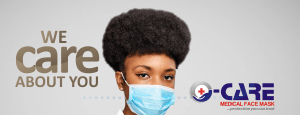In today’s world, face masks have become an essential accessory to protect ourselves and others from airborne particles and respiratory infections.

With an array of options available, it can be overwhelming to determine which face mask is most suitable for your needs. This comprehensive guide will explore the different types of face masks, highlighting their features, benefits, and how to choose the right one for optimal protection.
Different Types of Face Masks:
N95 Respirators:
N95 respirators are widely recognized as the most effective face masks in filtering out airborne particles, including viruses and bacteria.

These masks adhere to stringent standards set by regulatory bodies and provide a high level of filtration efficiency. N95 masks form a tight seal around the face, ensuring minimal leakage and maximum protection. They are recommended for healthcare professionals and individuals working in high-risk environments.
Surgical Masks:
Surgical masks are loose-fitting, disposable masks commonly used in healthcare settings. They provide a physical barrier against larger respiratory droplets and splashes, reducing the risk of contamination.

While surgical masks offer limited protection against smaller particles, they are effective in preventing the spread of infectious diseases, especially when worn by infected individuals.
Cloth Masks:
Cloth masks have gained popularity among the general public due to their comfort, style, and reusability.

Made from various fabrics, such as cotton or polyester blends, cloth masks offer a basic level of filtration and act as a barrier against respiratory droplets. It is important to choose a cloth mask with multiple layers for improved filtration efficacy.
KN95 Masks:
KN95 masks are similar to N95 respirators in terms of filtration performance but are manufactured to Chinese standards.

These masks offer a close facial fit and excellent filtration efficiency, making them a suitable alternative to N95 respirators. KN95 masks are widely available for public use and can provide a high level of protection when properly worn.
Disposable Masks:
Disposable masks, often made of non-woven polypropylene, are lightweight and easy to use. They offer a basic level of filtration and are designed for single use only.

Disposable masks are ideal for situations where frequent mask changes are required or when access to washing facilities is limited.
Respirator Masks:
Respirator masks, similar to N95 masks, provide advanced protection in environments with airborne contaminants, such as construction sites or industrial settings.

These masks feature replaceable filters to remove specific particles and ensure clean air inhalation. Respirator masks are designed to form a secure seal and are equipped with exhalation valves to facilitate comfortable breathing.
Valved vs. Unvalved Masks:
Some masks, particularly respirator masks, come with or without exhalation valves. Valved masks allow for easier exhalation, reducing heat buildup and moisture within the mask.

However, they may not be suitable for situations where the source control is important, as exhaled air can bypass the filtration system. Unvalved masks offer two-way filtration and are recommended for general use to prevent the spread of respiratory droplets.
Fit and Comfort:
Choosing a face mask that fits snugly and comfortably is crucial for effective protection. Look for masks with adjustable nose clips and ear loops to ensure a secure fit. Masks should cover both the nose and mouth without gaps or excessive tightness.

Comfort is also important, especially if you need to wear the mask for extended periods. Consider factors like breathability, the softness of materials, and any potential skin sensitivities.
Additional Features and Considerations
Beyond the basic functionality, some face masks offer additional features. These may include antimicrobial coatings, filter pockets for added protection, or clear panels for improved communication. Assess your specific needs and prioritize the features that align with your requirements.
Proper Mask Care and Usage
To maximize the efficacy of any face mask, it is essential to follow proper care and usage guidelines. Wash cloth masks regularly or dispose of disposable masks after each use. Store masks in a clean, dry place when not in use. Avoid touching the mask while wearing it and ensure proper hand hygiene before and after handling the mask.
Conclusion:
When it comes to choosing the right face mask, understanding the different types available is crucial. Whether you opt for the superior filtration of N95 respirators, the convenience of disposable masks, or the comfort of cloth masks, each type offers varying levels of protection. Consider factors such as filtration efficiency, fit, comfort, and specific requirements for your environment. By selecting the appropriate face mask and following proper usage guidelines, you can prioritize your safety and contribute to the well-being of those around you. Stay informed, and stay protected!


[…] recent times, face masks have become an essential accessory in our daily lives. They play a crucial role in preventing the […]
[…] warm air from your breath escapes through the top of your mask, it encounters the cooler surface of your glasses lenses. This temperature difference causes the […]
[…] are several types of disposable face masks available in the market. Each type offers varying levels of protection and is designed for specific […]